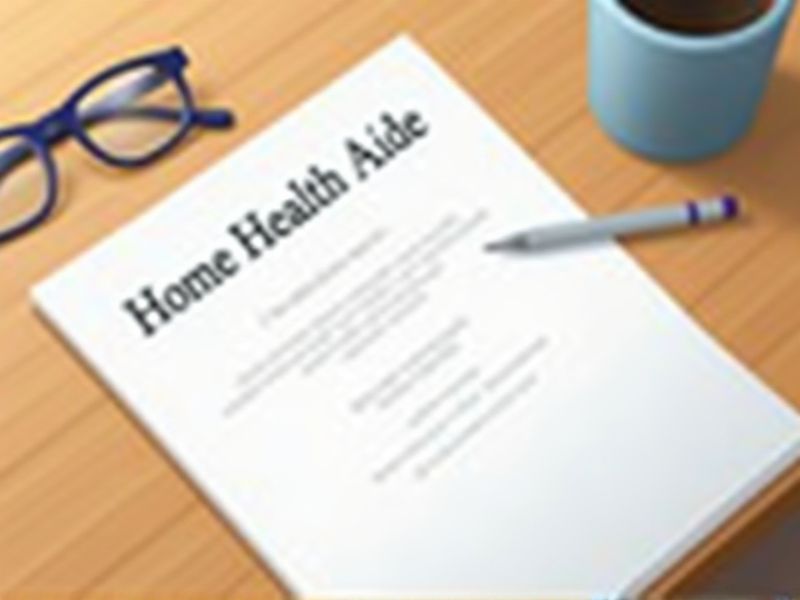
Home Health Aides provide essential care to individuals who are elderly, ill, or disabled, often working without direct supervision from medical professionals. Certification ensures aides possess critical competencies for patient safety, personal care, and emergency response. Employers and state regulations frequently mandate certifications to standardize quality and accountability across the industry. It's crucial for Home Health Aides to consider acquiring important certifications to meet these requirements.
Certified Home Health Aide (CHHA) Certification
A CHHA certification ensures that a home health aide possesses the necessary skills and knowledge to provide quality care to patients. It sets a standard of competence that helps protect patient safety and well-being. Certification can lead to more employment opportunities as many agencies require it for hiring. It often results in higher pay, recognizing the certified individual's commitment to professional development.
CPR and Basic Life Support (BLS) Certification
Home Health Aides frequently care for vulnerable individuals who might experience sudden medical emergencies, making CPR and Basic Life Support certification essential. Certification equips aides with the skills to recognize and respond to life-threatening situations, potentially saving lives. Many healthcare organizations require CPR and BLS certification as a standard qualification, ensuring a consistent level of emergency preparedness. Clients and families often feel more secure knowing that their home healthcare provider is trained to manage unexpected health crises.
First Aid Certification
First Aid Certification improves a Home Health Aide's ability to respond promptly to medical emergencies, minimizing harm to patients. It enhances caregiver confidence, leading to more effective communication and trust between aides and families. With certification, aides can ensure compliance with healthcare regulations, reducing liability and potential legal issues. Employers often prefer certified individuals, increasing job opportunities and career progression for those with First Aid skills in home healthcare settings.
Certified Nursing Assistant (CNA) Certification
A CNA certification ensures that home health aides possess essential skills and knowledge to provide safe and effective care to patients. This certification demonstrates a standardized level of competency, which can lead to improved patient outcomes. Holding a CNA certification often increases job opportunities and potential earnings in the healthcare industry. Regulations in many states require certification to ensure quality and consistency in home health services.
Bloodborne Pathogens Certification
Home health aides often come into contact with bodily fluids, and bloodborne pathogens certification ensures they are prepared to handle exposure safely. The training teaches aides to follow proper sanitation and personal protective equipment protocols, reducing infection risk. Certification supports compliance with healthcare regulations and standards, protecting both worker and patient. Knowledge from the certification enhances professional credibility and trust in home healthcare services.
HIPAA Privacy Certification
Home health aides often handle sensitive patient information, and HIPAA Privacy Certification equips them with the knowledge to ensure compliance with privacy regulations. Without proper certification, there is an increased risk of unintentional data breaches, which can lead to legal and financial consequences for healthcare providers. Certification fosters trust between home health aides and patients, as patients feel assured that their personal information is safeguarded. Adhering to HIPAA standards enhances the overall quality of care by ensuring that patient information is managed securely and ethically.
Alzheimer's and Dementia Care Certification
The aging population is increasing, which has led to a rise in Alzheimer's and dementia cases, requiring specialized care. Home Health Aides with certification in these areas ensure patients receive proper cognitive and emotional support. This specialized training reduces the risk of patient injury or distress by equipping aides with appropriate intervention strategies. Certified Home Health Aides contribute to improved patient outcomes and higher family satisfaction by delivering tailored care.
Infection Prevention and Control Certification
Infection Prevention and Control Certification equips Home Health Aides with essential knowledge to reduce the spread of infectious diseases, resulting in safer environments for vulnerable individuals. Compliance with healthcare standards through certification ensures that aides are updated with the latest infection prevention practices, minimizing risk factors for clients receiving care at home. This certification builds trust with patients and their families, as it demonstrates a commitment to maintaining high-quality care standards. Preventing infections in a home care setting directly contributes to reduced hospital readmissions and lower healthcare costs.
Medication Administration Certification
Medication Administration Certification becomes necessary for Home Health Aides due to the increasing complexity of patient care and medication regimens. Certification ensures aides are knowledgeable about correct dosage, methods of administration, and potential side effects, thereby reducing medication errors. Regulatory bodies and healthcare organizations often mandate certification to maintain compliance with legal standards and protect patient safety. Proper training and certification elevate the quality of care, instilling confidence in both patients and their families.
Fall Prevention and Mobility Training Certification
Falls among elderly patients often lead to serious injuries and increased healthcare costs. Home health aides with Fall Prevention and Mobility Training Certification possess the skills to identify and mitigate fall risks, reducing the likelihood of such incidents. Proper training ensures aides can effectively guide patients in maintaining mobility, which is crucial for their independence and quality of life. Certified aides are more equipped to provide tailored care plans, enhancing patient safety and confidence in home environments.
Summary
By obtaining certifications, you enhance your skills and credibility as a Home Health Aide. This typically leads to better job opportunities, as employers value certified professionals. Certification often results in improved patient care quality, as you gain specialized knowledge and techniques. Consequently, you may also experience increased job satisfaction and potentially higher pay.
